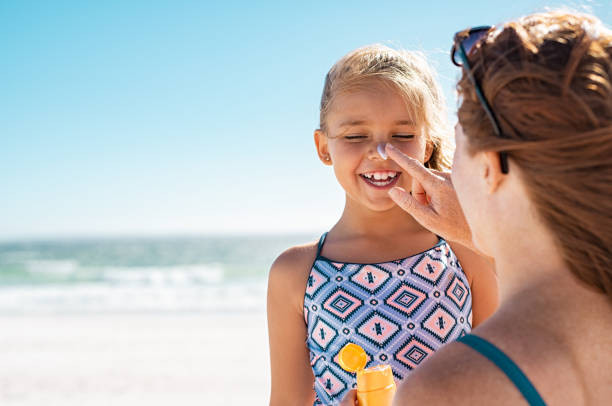Essential Skin Protection Tips for the Summer Season
Clemson, United States - June 10, 2025 / Clemson Apothecare /
As the summer months approach, it's essential to prioritize both sun safety and skin care. Whether you're spending your days at the beach, hiking in nature, or simply enjoying a sunny afternoon outdoors, taking care of your skin is crucial to protect it from the harmful effects of the sun. While the sun can provide many benefits, such as boosting vitamin D levels, overexposure can lead to skin damage, premature aging, and even skin cancer. To help you enjoy the sunny season while keeping your skin healthy, here’s a guide to the must-haves for sun safety and skin care this summer.
Why is Sun Protection Important?
The sun's ultraviolet (UV) rays can cause significant damage to your skin. These rays penetrate the skin layers, causing immediate effects such as sunburn and delayed effects such as skin aging, dark spots, and even skin cancer. UV rays are classified into UVA and UVB rays:
- UVA Rays: These rays penetrate deeper into the skin, causing long-term damage such as wrinkles, sagging, and age spots.
- UVB Rays: These rays are responsible for causing sunburns and are the primary cause of skin cancer.
Without proper protection, prolonged exposure to these rays can increase the risk of skin conditions. This is why it’s essential to make sun protection a priority in your summer skin care routine.
Sunscreen: Your First Line of Defense
One of the most critical summer skin care essentials is sunscreen. It's essential to apply sunscreen every day, even on cloudy or overcast days, as UV rays can still penetrate through the clouds.
Choosing the Right Sunscreen
When selecting a sunscreen, consider the following factors:
- SPF (Sun Protection Factor): SPF is a measure of how well the sunscreen protects against UVB rays. For adequate protection, choose a sunscreen with at least SPF 30. For prolonged exposure to the sun, an SPF of 50 or higher may be necessary.
- Broad Spectrum Protection: Broad spectrum sunscreen protects against both UVA and UVB rays. Be sure to choose a sunscreen labeled "broad spectrum" to ensure comprehensive protection.
- Water Resistance: If you plan on swimming or sweating, choose a water-resistant sunscreen. Water-resistant sunscreens are formulated to stay effective for a longer period while you're in the water or sweating.
Application Tips
To get the best protection from sunscreen, follow these guidelines:
- Apply sunscreen generously to all exposed skin areas at least 15 minutes before sun exposure.
- Reapply sunscreen every two hours, or more often if you're sweating or swimming.
- Don't forget to apply sunscreen to often-missed areas such as your ears, neck, and the backs of your hands.
Protective Clothing: Cover Up in Style
While sunscreen is essential, wearing protective clothing is an additional layer of defense that helps reduce your skin’s exposure to harmful UV rays.
UPF Clothing
Ultraviolet Protection Factor (UPF) clothing is designed specifically to block UV rays. These clothes are tested for their ability to block UV rays, and garments with a higher UPF rating offer more protection. Look for hats, long sleeves, and pants made from UPF-rated fabrics to provide extra sun protection.
Sunglasses
Your eyes need protection too! Prolonged exposure to UV rays can lead to eye damage, such as cataracts. Choose sunglasses that block both UVA and UVB rays. Look for sunglasses with a label indicating 100% UV protection to keep your eyes safe while enjoying the sun.
Hats
A wide-brimmed hat is another excellent way to protect your face, neck, and scalp from the sun. Look for hats that have a broad brim (at least 3 inches) for maximum protection. A wide-brimmed hat combined with sunscreen can provide complete coverage for your face and neck.
Hydration: Keep Your Skin Moisturized
Summer sun exposure can dry out your skin, leaving it feeling parched and irritated. Keeping your skin hydrated is just as important as protecting it from the sun.
Drink Plenty of Water
The best way to keep your skin hydrated from the inside out is by drinking plenty of water. Aim for at least 8 glasses a day, and more if you're spending time outdoors in the heat.
Use a Moisturizer
After sun exposure, use a good moisturizer to replenish lost moisture and help repair your skin. Look for a moisturizer with ingredients like aloe vera, hyaluronic acid, or ceramides, which help soothe and hydrate the skin. If you experience sunburn, an aloe vera-based moisturizer can help calm the skin and promote healing.
After-Sun Skin Care: Soothe and Repair
Even with sunscreen and protective clothing, your skin may still experience some damage from sun exposure. This is why after-sun care is crucial to repair and rejuvenate the skin.
Aloe Vera Gel
Aloe vera is known for its cooling and soothing properties. After sun exposure, apply aloe vera gel to areas that have been exposed to the sun. It helps reduce redness, provides hydration, and accelerates healing.
Antioxidant Serums
Using a serum with antioxidants such as vitamin C can help fight the effects of free radical damage caused by the sun. Antioxidants can also brighten your skin and repair skin damage, preventing premature signs of aging.
Avoid Harsh Exfoliation
After sun exposure, it's important not to exfoliate your skin with harsh scrubs or treatments. Your skin may be more sensitive after sun exposure, and exfoliating can cause irritation or worsen sunburn. Stick to gentle cleansers and moisturizers for a few days after sun exposure.
Sun Safety FAQs
Q: Can I get a tan without damaging my skin?
A: While tanning can make your skin look sun-kissed, it still exposes your skin to UV rays that can cause long-term damage. It's important to protect your skin with sunscreen if you're in the sun, even if you're aiming for a tan.
Q: How often should I reapply sunscreen?
A: You should reapply sunscreen every two hours, or more often if you’re swimming, sweating, or towel-drying. Even water-resistant sunscreen can lose its effectiveness after prolonged exposure to water or sweat.
Q: Is it okay to use sunscreen on my face every day?
A: Yes, you should use sunscreen on your face every day, even on cloudy days. The sun's harmful rays can penetrate through clouds and cause skin damage over time. Look for a facial sunscreen that is non-comedogenic (won’t clog pores) and designed for your skin type.
Q: How can I treat sunburn?
A: If you experience sunburn, cool your skin by taking a lukewarm bath or applying a cold compress. Aloe vera gel can help soothe the skin, and over-the-counter hydrocortisone cream can reduce inflammation. Be sure to drink plenty of water to stay hydrated and avoid further sun exposure until your skin heals.
Conclusion
Sun safety and skin care are essential during the summer months. With the right combination of sunscreen, protective clothing, hydration, and after-sun care, you can enjoy your time outdoors while keeping your skin healthy and safe from the sun’s harmful effects. Remember, the best way to protect your skin is through prevention—so start early, and make sun protection a part of your daily routine to enjoy the summer sun responsibly.

Contact Information:
Clemson Apothecare
103 Knox Ln
Clemson, SC 29631
United States
Clemson Apothecare
(864) 654-9120
https://clemsonapothecare.com/
Original Source: https://clemsonapothecare.com/media-room/#/media-room


